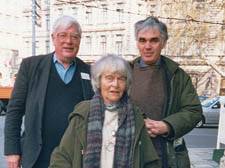|
|
 |
| |

Hugh Wood (left) with Milein Cosman
and Christopher Wintle |
Ferment of music and ideas
Helen Lawrence, who remembers being taught harmony by the composer Hugh Wood, now celebrates the long-awaited publication of a collection of his engaging and lively essays and reviews
Hugh Wood: Staking Out the Territory and Other Writings on Music. William Scott: Rough Circles.
Edited by Christopher Wintle.
Plumbago Poetics of Music series £15.99
THE publication of Hugh Wood’s essays on music is immensely welcome. One of our most respected and admired composers, he has pursued a triple career as composer, teacher and writer, adding significantly to the repertory of orchestral, chamber and vocal music. He has lectured at the universities of Glasgow, Liverpool and Cambridge, where he was a fellow of Churchill College, and has also taught at Morley College in London and the Workers’ Educational Association.
I was fortunate enough to encounter him 40 years ago as a student at the Royal Academy of Music, when he had the unenviable task of trying to din into me the rudiments of harmony. I remember thinking what a privilege it was to be taught by a distinguished composer – his name was already becoming well known – although I wished I was a more worthy pupil.
So I was delighted when, as chairwoman of the Hampstead and Highgate Festival, we were able to commission a new piece from this long-time Highgate resident to open the 2007 festival.
His music communicates directly with the listener through the strong vein of lyricism, clarity of its statements, and a mastery of craftsmanship. That clarity and directness also illuminates his work as an essayist, giving pleasure through wit and warmth, free of the impenetrable jargon or ideological rigidity that obfuscates so much academic discourse these days. His description of the “great ferment in instrument building” in the 19th century gives a flavour:
“Berlioz’s pages are rich in remnants of older species. Antique instruments like the teneroon, the bombardon, the serpent, the Turkish crescent, the Russian bassoon, glare out at us like strange sea monsters before diving forever into the depths of oblivion. Others have since marched away to the parade ground of the military band.”
Selected from Wood’s many reviews and critical prose over 40 years – for The Times Literary Supplement, Tempo, and the BBC among others – the book is skilfully edited by Christopher Wintle so that one is drawn into an engaging and thought-provoking ramble through the highways and byways of European culture, from Beethoven and Brahms to 20th-century figures such as Stockhausen, Schoenberg and Dallapiccola. The subject matter is wide-ranging and the style characterised by an openness to experience, by turns philosophical and humorous – as in an amusing quote from a diary reminiscence of Michael Tippett by David Mathews: “He talked for two-and-a-half hours with hardly a stop, about an enormously interesting composer called Tippett and his equally interesting music” – and always informative.
Of particular interest are the essays examining, as in the book’s title, the territory composers “stake out” for themselves.
He is forthright about the state of music today, finding a “thick fog of ambivalence about our musical past which arises from the unhappy mixture of being simultaneously both proud and ashamed of what we have been”. He considers that a thorough grounding in harmony and counterpoint is absolutely necessary but: “we find the whole practice of composition teaching to have collapsed entirely. Even the mere interchange of information between teacher and taught is clogged up by the circumstance that the pupil is not interested in receiving it – it isn’t ‘relevant’ to his or her needs.” And while they order some matters better in France, he comments wryly, “not always and not all the time and not at the Pompidoleum. It is also possible to write rubbish in Cologne”.
The book had been in gestation for many years but funding for it only became available recently. That came out of his long friendship with Hampstead-based musicologist, the late Hans Keller, and his wife the artist Milein Cosman. Milein had set up the Cosman Keller Art and Music Trust which has generously made publication possible. It is a compelling read for anyone interested in musical life and development.
|
 |
|
 |
 |
|
 |
|



